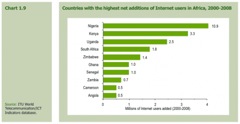
By Conor Godfrey
If you believe Jared diamond, geography gave certain parts of the world a first mover advantage that has exerted tremendous influence on world affairs from the dawn of agricultural societies to the present.
Around 8500 BC, the Fertile Crescent had 32 large seed grasses that lent themselves to rudimentary cultivation; Sub-Saharan Africa had 4.
Around the same time, Eurasia boasted all five of the important domesticateable animals while Africa had none.
In 2009, 74.2 % of people in North America could access the internet while 6.8 % of Africans could.
Guns, germs, steel, and internet access.
The internet’s growth in Africa will make this millennia old advantage as insurmountable as the guns that held the continent hostage in the 19th century, or it will be the great equalizer.
This process has already begun.
What do you do in Kenya if ants start eating your potato crop?
Well, you get on the Internet and learn that sprinkling wood ash on the plants will drive the ants away.
A “wired Imam” in Mali uses the Internet to promote tourism at Mali’s famous mud mosque in Djenne.
Some East African seamstresses receive orders via email.
My favorite thing about internet access is that it puts the onus on the user to take advantage of available resources as opposed to waiting for someone else to actualize their potential.
If you let your mind dwell for a moment on the social, political, and economic consequences of widespread internet use in Africa you will become dizzy.
What if protesters in African states could use web-based social networks like the Iranians?
Or if pictures of vote rigging in Benin made the rounds on youtube as fast as those of Burmese monks being beaten by security forces?
Access to micro-credit services like Kiva would skyrocket.
Banks and business records could be digitized.
The diaspora could lend their experience back home.
People could access legal information and use the law to their advantage.
Early warning systems for natural or manmade disasters could be improved.
People could learn languages, apply to international universities, and access an infinite variety of training materials online.
Officials would be scrutinized by a media with more access and resources.
I have to stop. I have gone and made myself dizzy.
All this is happening already but the pace of change will accelerate exponentially as more people get online.
So where are we now?
For the 60-100 million internet users in Africa (hard to figure when internet cafes account for much of the use), connecting remains slow and expensive—but this is changing fast.
From 2000 to 2009, internet access in Africa grew by well over 1000%.
Recently, a rash of privatizations in South Africa and elsewhere combined with infrastructural improvements to put more than 10% of South Africans online!

Projects like One Laptop Per Child and their competitors are striking deals with governments in Nigeria and Libya.
In rural Kenya, Google currently finances engineers from the University of Michigan to install small solar powered satellite dishes to connect villages to the web.
I am particularly impressed by the “hole-in-the-wall” learning centers inspired by Dr. Mitra’s success in India. He proved that children can teach themselves how to use the computer/internet without any supervision or guidance. Hole-in-the-Wall projects are now underway in Uganda. 
Within a few generations these projects and their progeny will connect almost a billion African consumers/producers with the rest of the world
Geographic determinism be damned. The information age might just level a playing field that has not been level since 8500 BC.
Related Reading:
Mobile phones might be the best route for African internet users.